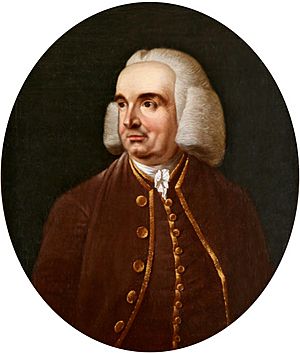Francis Drake (antiquary) facts for kids
Quick facts for kids
Francis Drake
|
|
|---|---|
 |
|
| Born | 1696 Pontefract, West Riding of Yorkshire, England
|
| Died | 16 March 1771 Beverley, East Riding of Yorkshire, England
|
| Nationality | English |
| Citizenship | United Kingdom |
| Known for | Publishing a history of York |
| Scientific career | |
| Fields | History Archaeology |
Francis Drake (born 1696, died 1771) was an English surgeon and a person very interested in old things and history, called an antiquary. He is most famous for writing an important history book about the city of York. He named his book Eboracum, which was the Roman name for York.
Contents
Early Life of Francis Drake
Francis Drake was born in Pontefract, England, in January 1696. His father, also named Francis Drake, was a vicar (a type of priest) there. When Francis was still a teenager, he started training to be a surgeon in York. His teacher was Christopher Birbeck.
When Birbeck passed away in 1717, young Francis, at just 21 years old, took over the surgery practice. Ten years later, he was given an important job as the city surgeon of York.
Francis Drake's Family Life
In 1720, Francis Drake married Mary Woodyeare in York Minster. Mary's father had worked for a famous person named Sir William Temple.
Francis and Mary had five sons. Mary Drake died in 1728 when she was 35 years old. She was buried in the church of St Michael le Belfrey in York.
Eboracum: A History of York
Francis Drake always loved history. He had even inherited some old historical manuscripts (handwritten documents). In 1729, he decided to write a history of York. He asked another historian, Thomas Hearne, for help, but it didn't work out.
However, his half-sister's husband, who was a schoolmaster, encouraged him. With help from many other historians and collectors, Drake began his big project. Several people helped him gather information for Eboracum, including John Anstis and Roger Gale.
Getting Support for the Book
By 1731, Drake asked the city of York for permission to look at their old historical documents. The city not only agreed but also gave him £50. This money helped him pay for pictures and illustrations in his book.
Another £50 came from Lord Burlington. Lord Burlington had also helped Drake out of a difficult financial situation. Drake dedicated his book to Lord Burlington to thank him.
Publishing Eboracum
Eboracum was a very large book, about 800 pages long. It was published in 1736. The full title was The History and Antiquities of the City of York, from its Original to the Present Time; together with the History of the Cathedral Church and the Lives of the Archbishops.
Many people helped pay for the book before it was even printed. There were 540 people who subscribed (paid in advance) for a copy. Important figures like the Archbishop of Canterbury bought copies.
Later Years and Other Works
Francis Drake became a member of two important groups: the Society of Antiquaries of London and the Royal Society in 1736. These groups were for people interested in history and science.
In 1741, he became an honorary surgeon at the new York County Hospital. He retired from this role in 1756. For a short time (1745–1746), he lost the position because he supported the Jacobite cause. This meant he supported the idea of a different royal family ruling England.
Even with his hospital duties, Drake spent most of his time on historical work. Between 1751 and 1760, he helped publish a 30-volume history series. This series was called The Parliamentary or Constitutional History of England.
In 1767, because of his health, he moved from York to live with his oldest son, Francis. His son was a vicar at St Mary's Church, Beverley. Francis Drake died in Beverley and was buried in that church. His son placed a memorial tablet there. His second son, William, also became a historian.
Francis Drake and Freemasonry
Francis Drake joined the Freemasons in September 1725. This was a secret society that met in lodges. Soon after joining, he was elected as a Junior Warden in the old lodge in York. This lodge called itself the Grand Lodge of All England.
Drake gave speeches at these meetings. In 1726, he gave a speech claiming that his York lodge was the most important. He said this was because old masonic writings stated the first lodge was held in York.
The York lodge stopped meeting for a while in the 1730s. But it started up again in 1761, with Drake as its first Grand Master. Even though Drake's health made him retire, his efforts helped the lodge stay active for another thirty years. His speeches are very important to historians today because they give a rare look into what an 18th-century Freemason thought.
 | Percy Lavon Julian |
 | Katherine Johnson |
 | George Washington Carver |
 | Annie Easley |

